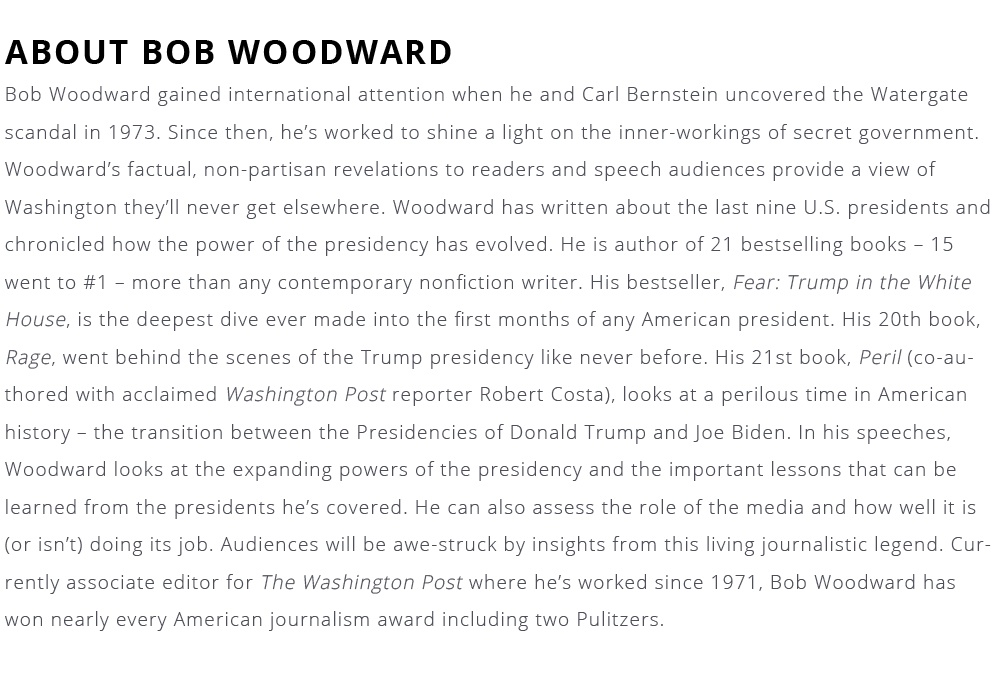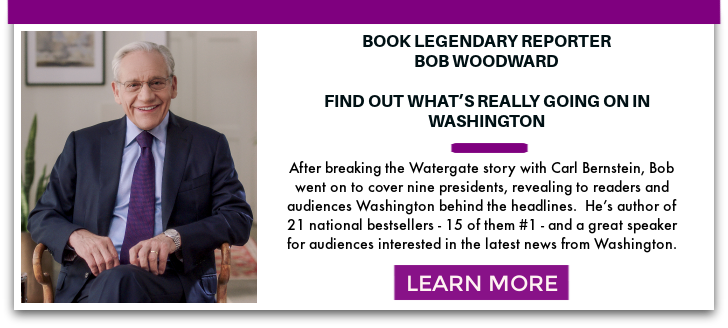By: D'Amelio Network on January 15th, 2019
Exclusive Interview: Bob Woodward on "Fear-Trump in the White House"
The article was originally published on the Walmart Book Blog. Interview by Gretchen Tarrant.
Walmart: Regarding your process for the book, obviously you’ve written about numerous presidents and there’s been a lot of conversation surrounding this book in particular, especially regarding your reporting technique of using deep background sources. In what ways was writing Fear and researching President Trump different from past books and presidents?
Bob Woodward: Well the same and different. In August when President Trump called me to complain that I hadn’t interviewed him—though I had tried to reach him through six different people—I said to him that there was no way I could do this book by going to the White House and just talking to people. I had to go talk to them at their homes and outside of the White House. The idea of show up, go see people . . . I had frankly become quite lazy, and was having people over here to my home, not going and knocking on enough doors at night. So I started doing that and found that it worked.
I tell the story about working on this last year, it was about 11 pm one night. I had the phone number for somebody at the White House and was sitting there thinking “Do I call them, do I not?”—a fork-in-the-road moment. I’m 74 at the time, you know, time to go to bed. But I had the phone number and I called him and said I wanted to interview him. He said to “call the office tomorrow.” The brush off—familiar with that [chuckles.] And I said: “Well how about now?” He said, “It’s 11 o’clock at night.” I said, “Well, I’m only four minutes from your house.” He was surprised, said: “How do you know where I live?”
I made the point that that was the easy part. So he said, “Okay, come on by.” And I did and fortunately his wife was out of town so we had a lot of time and I stayed for hours, it was almost, not quite, dawn when I left. And it reinforced the point of you have to be patient and have to go see people and just listen. I did much more of that, that kind of reporting out of people’s homes. Also going back and seeing people . . . repeatedly.
It was harder in the sense that I had to get off my ass, it was easier because it validated the technique, which I learned from Carl Bernstein, to go knock on doors at night.
LEARN THE INSIDE STORY ON WHAT'S REALLY GOING IN WASHINGTON,
AS ONLY LEGENDARY JOURNALIST BOB WOODWARD CAN TELL IT
WM: That actually leads me to my next question. You’re already the most renowned journalist of this generation. What motivated you to write something you knew would be provocative, at least for folks working in the White House, and to be knocking on doors so late at night when you’re 74 at the time on top of it? You must have felt pretty strongly about what you had.
BW: Well, clearly it’s a pivot point in history, and what goes on in the Trump White House—what I found is that we don’t know but part of the story—that there’s much more debate and hostility and intrigue and people stealing documents from his desk so he won’t sign them. The secretary of defense, Mattis, having to tell him we have these relationships like NATO and security arrangements with other countries and Trump kept [asking], “Well, why are we doing this,” and finally Mattis said, “We’re doing this to prevent WWIII, to keep us from having WWIII.” The idea that a president needs to be told that I found astonishing.
So, to the broader question, it’s an important moment in history, I wanted to see what I could find out by doing another book, I had done, this is the ninth president from Nixon to Trump. As Ken Burns told me last year, “So you do a book on Trump, you will have done a book on 20 percent of the presidents we’ve had.” That’s a lot.
BOB WOODWARD: Tense Times in the Situation Room
WM: When you’re reading through the book it’s shocking how volatile Trump seems, how short of an attention span he has . . . his temper and propensity to take a risk he doesn’t fully understand the consequences of. At any point in writing this, did you worry how the release of the book would affect the functioning of the White House?
BW: Well, no. As you know journalism is to find out what happened and you can’t launder [information.] The president should serve the public and I worry about the public interest and not his interest; the public interest is to know what’s really going on. Some of that, I mean as you say, Trump has got two obsessions. Well, he’s got many obsessions but two main policy obsessions: He thinks that trade deficits where we buy more goods from China than we sell to them . . . he somehow thinks we’re losing that money, that it’s going . . . but there are scenes in the book where they [his cabinet] are trying to say, “No, that doesn’t mean we are losing money.”
He thinks that these security arrangements like NATO, we are being played as suckers; [that] we’re providing the defense for other countries, and the generals and everyone say, “No, no for that’s our defense . . . those are the best national security dollars we spend.” So, we need to know what really goes on, and this adds a significant dimension to what happens [in the White House] on a range of national security issues, economic issues, financial issues.
BOB WOODWARD: Trump’s decision making – It’s not a team
WM: I listened to your interview recently on the Daily with Michael Barbaro. At one point, you noted that journalists have to do stories to get stories. I’m curious, since you released the book, have you gotten more stories? Has this lead to more investigation on your part and do you expect or would you consider writing another book?
BW: I would. Well, we’ll see. There are always a lot of loose ends after a book . . . so you know you keep working. Reporters have great jobs, they make momentary entries into people’s lives when they are interesting, and then get the hell out when they’re not interesting. It’s a great job, and it’s nice and relevant to be working on something that people want to talk about and something that is clearly going to have an impact on the country and the world.

.png)
.jpg)



